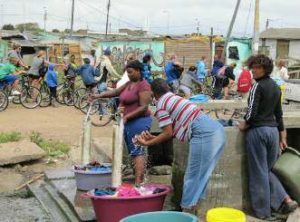SOUTH AFRICA, MARCH 12—The Western Cape is currently experiencing a drought and as a result Cape Town will run out of water at any moment. What is important is to understand the cause of this crisis. The media may claim that it is due to the changing weather conditions. Some put the blame on the masses saying they do not save water. The question is: who consumes water and what is it used for?
In South Africa we use water in so many ways. The masses use it to drink, cook and for other basic needs. It is not only the masses who use water. The bosses need water to make profit. They use it in the mining industry, agriculture, etc. And in all these industries, it is public knowledge that they use millions of gallons of water which is way more than the masses use. After they use water and after exploiting the masses, the masses do not benefit at all as they produce for exchange value and not use value.
They blame the masses for wasting water but the masses consume a small fraction compared to what the bosses consume. An average worker consumes about 30 liters of water a day, but the bosses say that we must save water. But they are the ones who should be saving water. Instead they use gallons to brew beer we do not need. They also use it for commercial farming, for their lush lawns and gardens, and they have swimming pools that have running water for 24 hours a day. In a recent study, it emerged that Cape Town residents used 70% of water – homes lead at 55%, with informal settlement residents’ (black families in townships) usage trickling in at a mere 4.7% .
In Los Angeles County (USA), during a previous drought, the 11 million residents of Los Angeles County were urged to preserve water. Later an article in the Los Angeles Times revealed that only 5% of the water was consumed by the residents, while the remaining 95% was used by industry. .
As ICWP we also see the need for the eradication of borders as a must. South Africa is rich in mineral resources but it doesn’t have enough dams and as a result, when it comes to water it is supplied by Lesotho. This means that without borders there would be no shortage of water. These borders are a result of capitalism.
It is often said that the next world war will be fought over water. The conflict between Ethiopia and Egypt is a testimony to this fact. These two countries and many others, including Sudan and South Sudan, depend on the Nile River for water. This is also the centre of their dispute. Ethiopia, as one of the upstream countries wants to build a dam drawing water from the Nile. This means the downstream countries will get less water. Hence Egypt views this as a threat to their survival because the Nile is their only source of water.
Without borders, this would never happen. Scarce resources sharpen capitalism’s huge inequality. Therefore we need to fight for a communist society to eradicate borders, profit, private property and privilege, because those are the main causes of this water crisis.

Capetown: Iaga Township

Capetown: Rondebosch Golf Club

